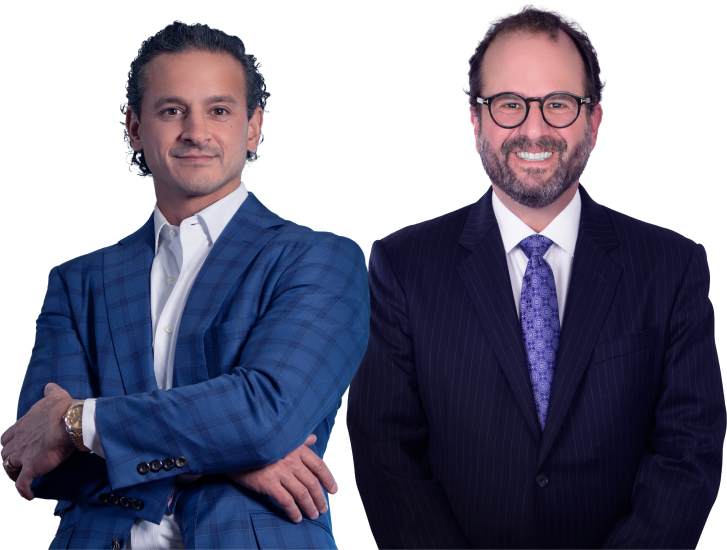Fort Lauderdale
Distracted Driving Accident Attorney

Were you injured in a car accident caused by a distracted driver? If so, you might be struggling to afford the medical care you need, fix your car, or pay your bills while you’re too hurt to work. You should not have to pay for another driver’s bad behavior behind the wheel. Depending on the circumstances, you could be entitled to compensation for your injuries and related losses.
The Fort Lauderdale distracted driving accident lawyers at Phillips | Tadros, P.A., have nearly four decades of combined legal experience. We have a strong track record in getting injured Floridians like you the money and accountability they deserve from auto accidents. Contact our office today for a free initial consultation about your case.
What Is Distracted Driving?
Distracted driving occurs when a motorist operates a vehicle while engaging in any activity that prevents them from focusing their full attention on driving. If drivers are distracted at the wheel, they are considerably more likely to crash because they overlook imminent traffic hazards or make preventable driving errors.
According to neuroscientific research, distracted driving is dangerous because the human brain is not wired to pay attention to two or more things simultaneously. When you try to do two tasks at the same time, your performance on both tasks suffers. And because driving is a complicated, high-risk activity, driving is impossible if you are focused on activities other than driving.
Common Causes of Distracted Driving
Drivers can be distracted for various reasons, but the Centers for Disease Control and Prevention (CDC) categorize driving distractions in three ways:
Visual Distractions
A visual distraction prompts drivers to take their eyes off the road ahead. Common types of visual distractions include:
- Text messages
- Data on cell phone screens
- GPS devices
- Vehicle dashboard controls
- Billboard advertisements
- Roadside accidents
Manual Distractions
A manual distraction prompts drivers to take their hands off the wheel while driving. Common types of manual distractions include:
- Typing or texting on the phone
- Eating while driving
- Drinking beverages, especially hot coffee
- Assisting vehicle passengers
- Smoking
- Personal grooming, such as putting on makeup
- Changing clothes
- Adjusting control knobs
Cognitive Distractions
A cognitive distraction takes a driver’s mind off of the road. Common types of cognitive distractions include:
- Text messages
- Phone calls or videos
- In-vehicle conversations
- Daydreaming
- Excessively loud music
Why is Texting While Driving So Dangerous?
The CDC notes that texting is one of the most dangerous driving distractions because it involves all three categories of distractions:
- Drivers must look at their phones to read or write messages (visual distraction);
- Use their hands to type or open texts (manual distraction); and
- Focus their thoughts on the content and meaning of a text (cognitive distraction).
Does Florida Have a Distracted Driving Law?
As in most states, Florida has distracted driving laws that say texting and driving is illegal statewide. One law, Florida Statute § 316.305, provides for “primary enforcement” of the texting-while-driving ban. Primary enforcement means state law enforcement officers have the authority to stop and ticket drivers for texting and driving regardless of whether they are committing any other traffic infractions when pulled over.
Florida police officers can cite drivers for texting while driving if they:
- Manually type or enter multiple letters, numbers, symbols, or characters on a wireless communications device while driving.
- Send or read data on a wireless communications device to engage in written interpersonal communication while driving.
- Engage in texting, emailing, or instant messaging of any kind while driving.
- Use a wireless communications device “in a handheld manner” while driving through a designated school crossing area, school zone, or work zone.
The law specifies that Florida’s texting-and-driving ban does not apply to:
- Operators of authorized emergency vehicles, such as law enforcement vehicles and ambulances, performing their official duties
- Drivers reporting emergencies or suspicious activities to law enforcement
- Drivers receiving messages related to vehicle operation, navigation, or safety
- Drivers using communication devices or systems for navigation purposes
- Drivers conducting interpersonal communication that does not require them to enter multiple letters, numbers, or characters to activate a feature or function
- Drivers conducting interpersonal communication that does not require them to read text except to activate a feature or function
- Drivers operating autonomous vehicles with automated driving systems engaged
- Drivers of stationary motor vehicles
Florida law states that the distracted driver’s cell phone records are admissible as evidence in subsequent legal claims when a distracted driving accident results in bodily injury or death. Our personal injury lawyers can help you obtain this kind of valuable evidence to support your distracted driving accident claim.
What Are the Dangers of Distracted Driving in Florida?
Distracted driving accidents occur far too often in Florida. The following statistics from the Florida Department of Highway Safety and Motor Vehicles (FLHSMV) illustrate just how common and deadly distracted driving is statewide:
- One recent year saw 56,594 distracted driving accidents across the state.
- As a result of those 56,594 distracted driving crashes, there were 2,726 serious bodily injuries and 350 fatalities.
- In another recent year, there were 129,442 people involved in distracted driving crashes statewide. Of these individuals, more than 26,000 suffered “possible” injuries, nearly 12,000 suffered “non-incapacitating injuries,” and over 2,700 suffered “incapacitating injuries.”
- That same year, 314 people died in Florida from distracted driving accidents.

How Much Is My Distracted Driving Accident Case Worth?
Florida follows a no-fault auto insurance system, so if you get hurt in a distracted driving accident, you must file an initial claim with your no-fault insurance provider. All Florida drivers must carry at least $10,000 in personal injury protection (PIP) coverage, which provides compensation for the following losses after an accident:
- Up to 80 percent of the value of the reasonable medical expenses you incur due to your accident injuries
- Up to 60 percent of the value of any wage losses you incur due to missed time at work while you recover from your injuries
- Up to $5,000 in death benefits for surviving loved ones of fatally injured victims
If your crash injuries are severe enough to meet certain statutory thresholds, you might be able to “step outside” of the no-fault system and file a third-party insurance claim or lawsuit against the other driver. With a third-party insurance claim or suit, you could seek compensation for financial and personal losses, including:
- The total value of the medical expenses you incur for your crash-related injuries
- Any incidental expenses you incur, such as mileage costs for medical travel
- The full value of any wage losses you incur due to missed time at work
- The projected value of losses in earning potential, if your injuries are permanent
- Subjective losses like your injury-related pain, suffering, and lost quality of life
How Can I Prove the Other Driver Was Distracted After a Fort Lauderdale Car Accident?
Distraction is highly subjective, so proving that another driver was distracted in a crash is often tricky. However, an experienced Fort Lauderdale distracted driving accident attorney can assist. At Phillips | Tadros, P.A., we will identify, collect, and preserve the following types of evidence to support your claim:
- Cell phone records showing the other driver’s texting or calling history
- Statements from witnesses who saw the crash occur
- Testimony or crash reports from police officers at the scene of the crash
- Photos of the accident scene and video footage from traffic or dashboard cameras
- Accident reconstruction diagrams from engineers and other crash experts
How Long Do I Have to File a Distracted Driving Accident Lawsuit?
When you cannot obtain the compensation you are owed from an insurance claim, you might have to file a personal injury lawsuit against the distracted driver. If so, remember that Florida law gives you only four years from the accident date to sue. If you try to sue after the four-year deadline, the court will likely dismiss your case, and you will lose your right to pursue compensation in civil court.
Although four years may sound like plenty of time, building a robust case can take months. At Phillips | Tadros, P.A., our Fort Lauderdale distracted driving accident attorneys can help you by keeping track of important deadlines, filing paperwork on time, and communicating with other parties on your behalf.
How Can a Fort Lauderdale Distracted Driving Accident Injury Lawyer Help Me?
An experienced distracted driving accident lawyer in Fort Lauderdale will help you by:
- Identifying all potential sources of compensation for your crash injuries and other losses.
- Investigating the accident to determine the cause and identify all liable parties.
- Communicating with insurance companies and other parties on your behalf.
- Obtaining medical records, crash reports, and other evidence for your claim.
- Interviewing witnesses and reliable experts for valuable case testimony.
- Managing essential case documents, details, and deadlines on your behalf.
- Filing claims paperwork and working relentlessly to maximize your settlement.
